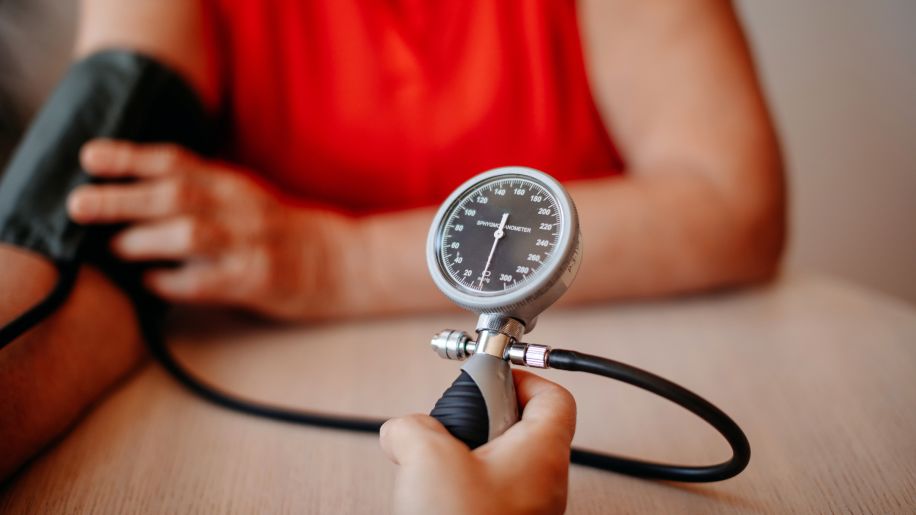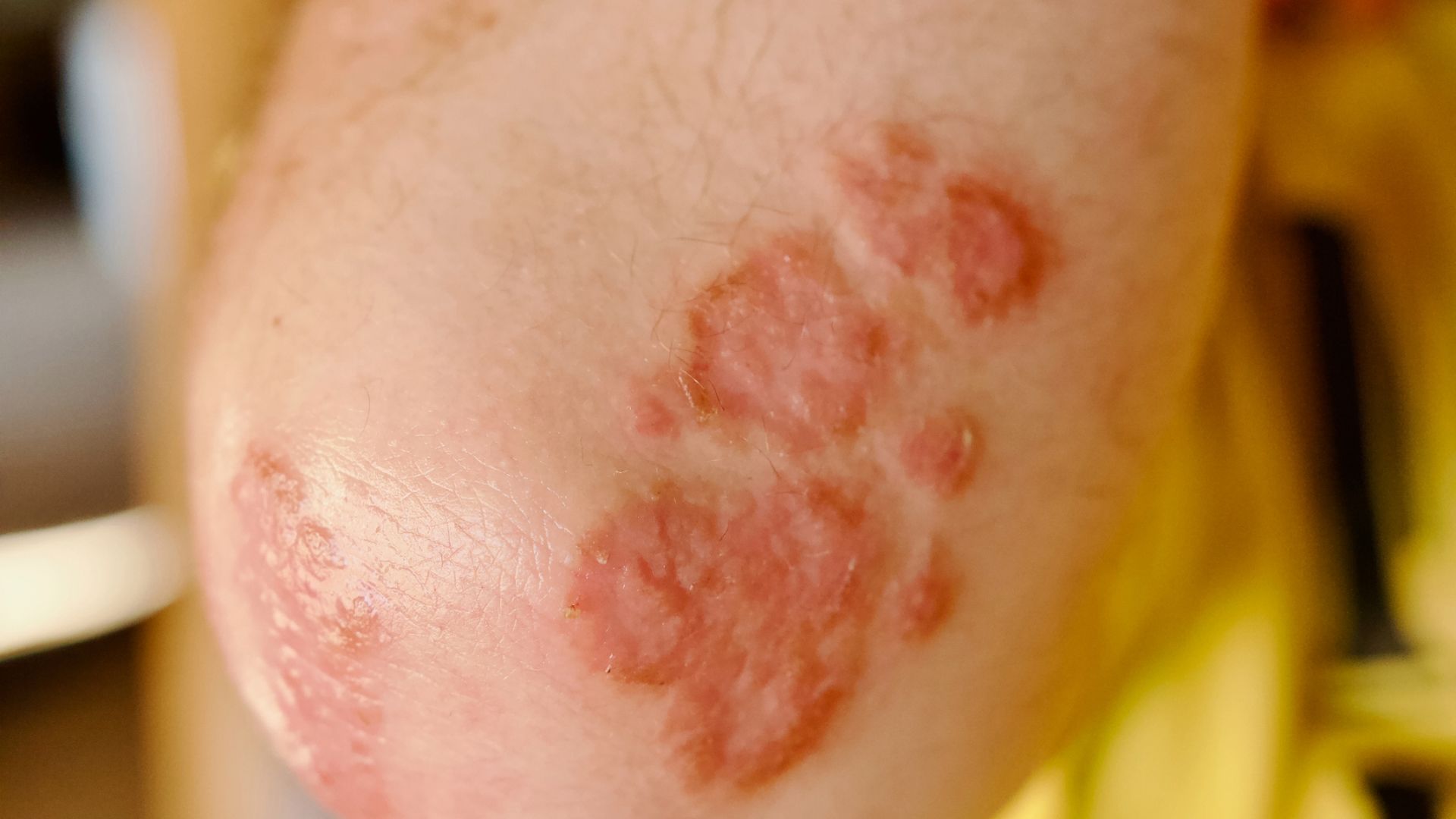7 long-term health effects of psoriasis
How psoriasis affects your heart, liver, joints and more—and what to do about it.

Psoriasis is much more than a skin condition. Though skin symptoms are the most recognizable symptoms of psoriasis—particularly the raised, silvery patches of dead skin that occur with plaque psoriasis—the condition causes inflammation throughout the body, and is associated with a number of other conditions that can cause long-term damage to your health.

Heart disease
Psoriasis is associated with an increased risk of heart disease and an increased risk of dying from heart disease. Also called cardiovascular disease, heart disease is the name given to a collection of conditions that make it difficult for your heart to function. The most common form is coronary artery disease, where the walls of the arteries near the heart become narrowed and hardened due to a buildup of arterial plaque. This forces the heart to work harder to supply the body with blood, and can lead to heart attacks, cardiac arrest, heart failure, stroke and other deadly disorders.
What’s the connection between psoriasis and heart disease? Healthcare experts believe the answer is inflammation. The overactive immune response that causes psoriasis symptoms to appear on the skin also causes inflammation in the blood vessels. Inflammation in the blood vessels contributes to the narrowing and hardening of arteries.

Type 2 diabetes
Type 2 diabetes is a condition where the body is unable to effectively produce enough insulin, or is unable to effectively use the insulin it can produce; insulin is a hormone the body requires in order to metabolize glucose (sugar). When too much glucose builds up in the blood, it can damage the eyes, nerves, kidneys and other parts of the body. Type 2 diabetes is also a major risk factor for heart disease.
Data shows that people with psoriasis have a greater risk of developing type 2 diabetes, and that the risk increases when psoriasis symptoms are more severe. While more research is needed to fully understand the connection between the conditions, there’s evidence that psoriasis causes insulin resistance, preventing the body from using insulin effectively.

Metabolic syndrome
Metabolic syndrome is the name given to a cluster of conditions that occur together and increase a person’s risk of heart disease, type 2 diabetes and stroke. This cluster of conditions includes excess body fat around the waist, elevated blood pressure, high blood sugar, low levels of HDL cholesterol (the good cholesterol) and high blood triglycerides (a type of fat found in the blood). If you have three or more of these conditions together, you have metabolic syndrome.
Metabolic syndrome is more prevalent among people who have psoriasis, and psoriasis symptoms also tend to be more severe in patients with metabolic syndrome.

Liver disease
Inflammation from psoriasis can also damage the liver. Psoriasis is associated with a potentially life-threatening condition called nonalcoholic fatty liver disease (NAFLD). With NAFLD, triglycerides (blood fats) accumulate in the cells of the liver, leading to damage and scarring. Over time, the buildup of scar tissue in the liver can lead to fibrosis and eventually cirrhosis of the liver. With cirrhosis, there is not enough healthy tissue for the liver to function properly, which leads to liver failure.

Psoriatic arthritis
Psoriatic arthritis is a type of arthritis that occurs in an estimated 20 to 30 percent of people who have psoriasis. With psoriatic arthritis, also called PsA, inflammation targets the joints, causing stiffness, pain, swelling and tenderness. Over time, the damage caused by this inflammation can cause the joints to become immobile and deformed. Any joints in the body can be affected—fingers, wrists, elbows, knees and even the spine.

Sleep disorders
Itching, pain and the stress of psoriasis can keep you up at night. Psoriasis is associated with several major sleep disorders, including insomnia, restless leg syndrome and obstructive sleep apnea, a condition in which the upper airways close during sleep. Sleep deprivation can disrupt your life in a number of other ways—it increases your risk of illness, increases cravings for unhealthy foods, impacts your job performance, takes a toll on relationships and even increases your risk of having an accident.

Mental health
Anxiety and depression are common among people who have psoriasis. Research shows that some of this may stem from the stigma attached to the skin disorder, and the feelings of low self-esteem, mental distress and frustration that can occur when symptoms are difficult to manage. Other research points to the same factor that puts patients at risk for many other conditions on this list—inflammation, which can affect the brain and exacerbate mental health symptoms.

Reducing your risk
If you have psoriasis, it is important that you work with your healthcare provider to monitor your risk for the conditions discussed here. There are also a number of steps you can take to reduce your risk of the long-term effects the condition can have on your health.
While having psoriasis may increase your risk for heart disease, type 2 diabetes, metabolic disorder and liver disease, lifestyle factors still play a major role in the development of these conditions. Data shows that people with psoriasis drink more often, are more likely to smoke and are less likely to exercise, all of which likely contribute to the higher prevalence of these conditions among people with psoriasis. You can help reduce your risk of many major health problems by eating a healthy diet and getting regular exercise—and by eliminating habits like cigarette smoking, drinking alcohol and overdoing junk food.
For depression, anxiety and other mental health issues, it’s important to seek treatment. Counseling and therapy are effective treatments for anxiety and depression, and can also help you manage the range of emotions that anyone with psoriasis may experience. If you are struggling with sleep, talk to your healthcare provider about this symptom.
Finally, work with a healthcare provider to find a treatment that works for you. More severe psoriasis symptoms are also associated with an increased risk of comorbidities. In addition to helping you achieve clearer skin, a treatment plan may also help you reduce your risk of some of these long-term health effects of psoriasis.

National Psoriasis Foundation. “Comorbidities Associated With Psoriatic Disease,” “Psoriasis linked to increased risk for metabolic syndrome,” “The Immune System and Psoriatic Disease,” “Depression.”
Catherine Ni, and Melvin W Chiu. “Psoriasis and comorbidities: links and risks.” Clinical, Cosmetic and Investigational Dermatology vol. 7 119-32. 17 Apr. 2014.
Lisa Rapaport. “Psoriasis patients face increased risk of heart attacks and death.” Reuters. September 28, 2017.
Merck Manual. “Overview of Coronary Artery Disease,” “Fatty Liver.”
MedicalNewsToday. “Psoriasis severity may influence type 2 diabetes risk.”
UC Davis Health. “People with severe psoriasis have nearly twice the risk of diabetes.”
M Gyldenlove, H Storgaard, et al. “Patients with psoriasis are insulin resistant.” Journal of the American Academy of Dermatology. Volume 72, Issue 4, April 2015, Pages 599-605.
Mayo Clinic. “Metabolic Syndrome.”
American Heart Association. “About Metabolic Syndrome.”
JM Gelfand and Howa Yeung. “Metabolic syndrome in patients with psoriatic disease.” The Journal of Rheumatology. Supplement. Vol. 89 (2012): 24-8.
R Prussick, et al. “Nonalcoholic Fatty liver disease and psoriasis: what a dermatologist needs to know.” The Journal of Clinical and Aesthetic Dermatology. Vol. 8,3 (2015): 43-5.
Johns Hopkins Arthritis Center. “Psoriatic Arthritis.”
AJ Sankowski, et al. “Psoriatic arthritis.” Polish Journal of Radiology. Vol. 78,1 (2013): 7-17.
MA Gupta, FC Simpson, AK Gupta. “Psoriasis and sleep disorders: A systematic review.” Sleep Medicine Reviews.” Volume 29, October 2016, Pages 63-75.
Johns Hopkins Medicine. “The Effects of Sleep Deprivation.”
Beth Orenstein. “Sleep better with psoriatic disease.” National Psoriasis Foundation. April 5, 2017.
Melissa Leavitt. “The link between psoriatic disease and mental illness.” National Psoriasis Foundation. May 28, 2015.
BIRC Ferreira, et al. “Psoriasis and Associated Psychiatric Disorders: A Systematic Review on Etiopathogenesis and Clinical Correlation.” The Journal of Clinical and Aesthetic Dermatology. Vol. 9,6 (2016): 36-43.
Oliveira, Maria de Fátima Santos Paim de et al. “Psoriasis: classical and emerging comorbidities.” Anais brasileiros de dermatologia vol. 90,1 (2015): 9-20.
Gisondi, Paolo et al. “Management of moderate to severe psoriasis in patients with metabolic comorbidities.” Frontiers in medicine vol. 2 1. 21 Jan. 2015.
H Yeung, J Takeshita, et al. “Psoriasis severity and the prevalence of major medical comorbidity: a population-based study.” JAMA Dermatology. 2013 Oct;149(10):1173-9.
K Busse and W Liao. “Which Psoriasis Patients Develop Psoriatic Arthritis?.” Psoriasis Forum. Vol. 16,4 (2010): 17-25.
JM Gelfand, H Yeung. “Metabolic syndrome in patients with psoriatic disease.” The Journal of Rheumatology. 2012 Jul;89:24-8.
Penn Medicine News. “Psoriasis Severity Linked to Increased Risk of Type 2 Diabetes.” November 14, 2017.
SK Kurd, et al. “The risk of depression, anxiety, and suicidality in patients with psoriasis: a population-based cohort study.” Archives of Dermatology. Vol. 146,8 (2010): 891-5.
Featured Content

article

article

article

article
